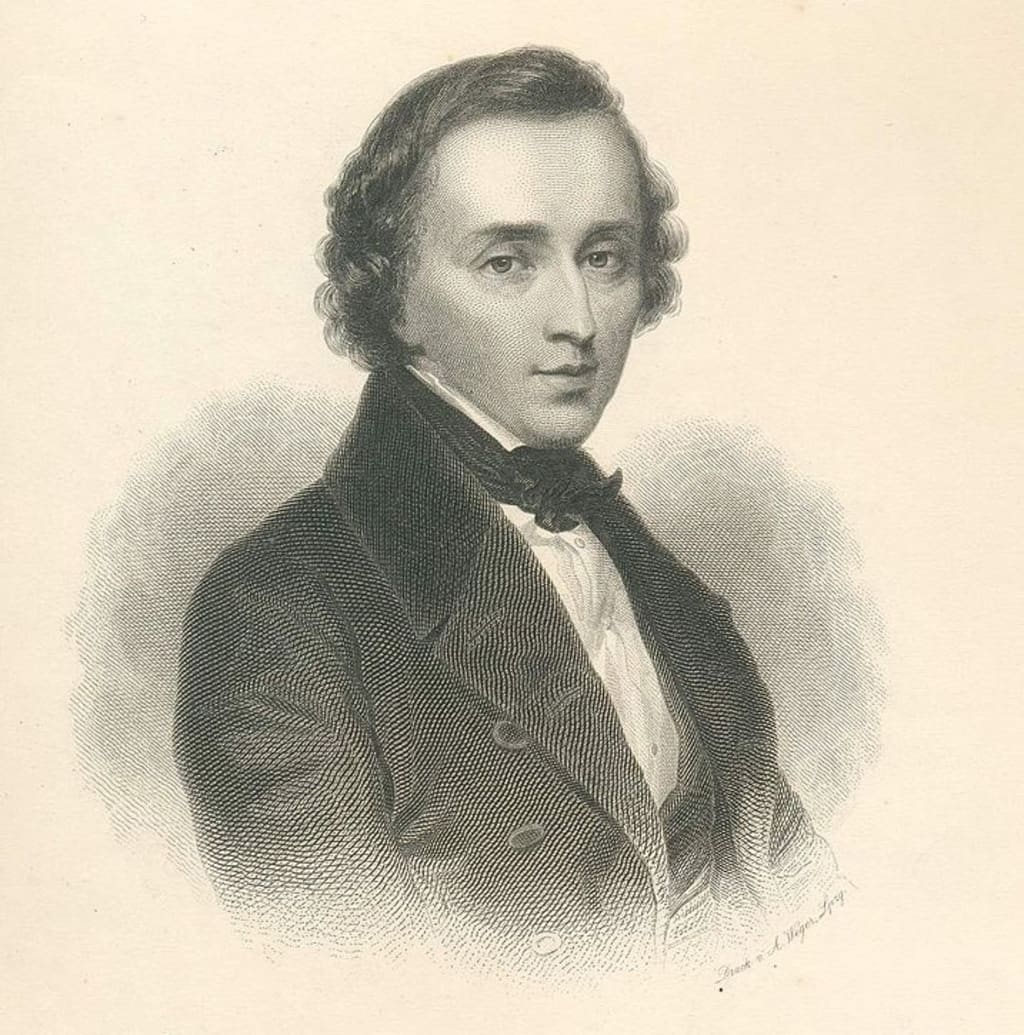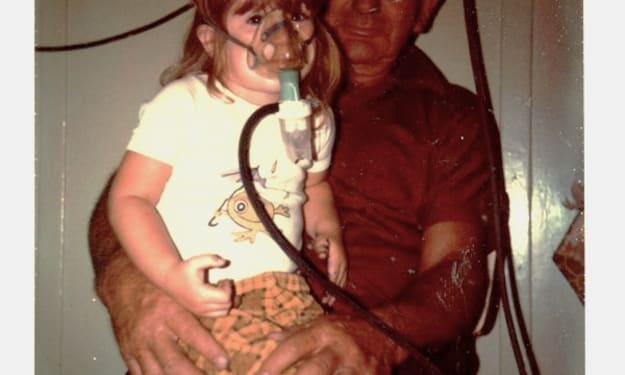Could Chopin Be the Most Famous Person With Cystic Fibrosis?
The composer's ill health shares many traits with a genetic disease

The urge to cough was strong. Stronger still was the need to finish.
Back rigidly straight, Fryderyk Chopin's fingers danced. Just a little more. Nearly there. The melody took over. Lost in the soothing sounds, Chopin blocked out his bodily needs.
Nothing mattered but the music. The melody. The crescendo.
Until the cough exploded.
Nothing could stop the cough. It was never-ending. A soul-sucking, deep to the bones cough. Followed by a metallic tang filling his mouth.
Chopin drew his white handkerchief from his top pocket and wiped his lips. A bloody streak stained the white linen.
Chopin was a sickly, delicate child
Tuberculosis was always the front runner to be the root of Chopin's various maladies. However, time after time, doctors dismissed the notion in favour of "irritated lungs," and "bronchial mucosities.''
Diarrhoea was a common occurrence- fatty foods were the worst. A constant cough, more prevalent in the winter months, plagued Chopin. At sixteen, Chopin's health took a turn for the worse. Bouts of productive coughing came with haemoptysis (coughing blood). Along with his respiratory complaints, headaches were his constant companion.
For the next two decades, Chopin experienced episodic bouts of illness— particularly in winter.
In 1847, before his death, Chopin's breathing progressively became more laboured. Chest pain often accompanied his difficulty breathing. For years doctors relegated a diagnosis of tuberculosis to the back burner. Now it became the front runner.
The Case For Cystic Fibrosis
Chopin's medical history matches lived experience of many people with Cystic Fibrosis (CF)— including mine.
As a child, I experienced relatively little lung involvement. Had my mother not constantly pushed for a diagnosis other than failure to thrive, I could have easily slipped through the cracks until my mid-twenties.
Chopin's lifelong illness had an episodic nature. Exacerbations caused by CF are also episodic. People living with CF have relatively normal lives in between acute respiratory infections. We work, travel and have children - just like other people.
Chopin's vital statistics measured him at 5 feet 7 inches (1.7 meters) as an adult. He weighed a mere 88 pounds (40 kilograms). For those with CF who have chronic malabsorption, gaining and maintaining weight is challenging.
Chopin was childless. As a general rule, men with CF are infertile. To have biological children, men with CF need access to reproductive technology.
Józef Kurowski's sketch "Fryderyk Chopin Making a Toast", in 1837 depicts a stick-thin man. A barrel chest is prominent in the drawing. People with CF often develop a barrel chest when our lungs work harder than usual to breathe.
Only one person in Chopin's immediate circle succumbed to a respiratory illness. His sister died aged fifteen. This supports the theory of CF over tuberculosis. Tuberculosis is highly contagious, and Chopin would have infected others. CF is a genetic disease that isn't contagious.
CF wouldn't be "discovered" until nearly a century later. Tuberculosis was an easy diagnosis. Many childhood deaths attributed to tuberculosis may have had other causes.
The Case Against Cystic Fibrosis
The most pressing case against a diagnosis of CF is Chopin's age. Dying at the ripe old age of thirty-nine appears to preclude a diagnosis of CF. However, CF is a progressive disease, and middle-aged people can receive a positive CF diagnosis.
As a pianist, Chopin's fingers were constantly on show. Despite a history of respiratory complications, there are no references to Chopin having clubbed nails. Low oxygen levels in the blood result in clubbed nails. Clubbed nails are a feature of many respiratory diseases.
A team of Polish scientists viewed high-resolution photographs of Chopin's preserved heart. They sighted a fine layer of white fibrous material and small lesions.
"We can say that it is highly possible that it was tuberculosis" - Michael Witt, lead scientist.
DNA holds the answer — so what's the hold-up?
The odds of outwitting the genetic lottery improve depending on when you were born. So too, do the odds of surviving tuberculosis. Chopin was unlucky to be born in the 1800s.
It's safe to assume one thing. When Chopin died, he most likely had tuberculosis. The high-resolution photos of his heart support this.
A diagnosis of tuberculosis doesn't preclude genetic diseases like CF. It doesn't answer why Chopin experienced respiratory problems for decades. Nor does it completely answer the questions raised by Chopin's lifelong health issues.
Researchers estimated the survival from tuberculosis. The numbers came in at ten to fifteen years without access to modern medicine. Chopin's lingering cough started in childhood, long before he coughed up blood at sixteen.
The only way to gain a concrete answer would be to perform genetic tests on Chopin's heart. The Polish government ruled this out as an option in 2008. The risk of damaging the preserved organ is far too great. For this reason, the scientists on Michael Witt's team used high-resolution photos to examine Chopin's heart.
Performing DNA on Chopin's parents could also provide the answer. It seems like extraordinary lengths to go to satisfy human curiosity — after all, it's not like the definitive answer would change the world.
Perhaps it's enough to know that the perfect storm of living with a health crisis also created a musical genius.

Sandi Parsons is a Cystic Fibrosis Warrior who has defied statistics since 1972. She lives with her favorite husband and two problem puppies. Her superpower is the ability to swallow twenty-seven tablets at once.
About the Creator
Sandi Parsons
Sandi Parsons lives and breathes stories as a reader, writer, and storyteller. Subscribe to my newsletter & receive my free ebook The Last Walk → https://bit.ly/3cGvsPB
Reader insights
Nice work
Very well written. Keep up the good work!
Top insights
Compelling and original writing
Creative use of language & vocab
Easy to read and follow
Well-structured & engaging content
Excellent storytelling
Original narrative & well developed characters
Expert insights and opinions
Arguments were carefully researched and presented
Eye opening
Niche topic & fresh perspectives
Heartfelt and relatable
The story invoked strong personal emotions
Masterful proofreading
Zero grammar & spelling mistakes







Comments (3)
Great story telling of Chopin's life. Great awareness of CF as well. Thank you.
As a lover of all music composed by Chopin, I immediately read your story. I found it quite interesting and was surprised that I had never contemplated the possibility of CF for his long endured illness. Regardless, I have always thought that his trials and tribulations with his health led him to create some of the most delicate and haunting pieces of classical music - nearly as if they are a mirrored image of the man himself. Thank you for this piece. I really enjoyed it.
Fascinating story, and very well-told. You taught me something new today. Thanks for sharing, Sandi!